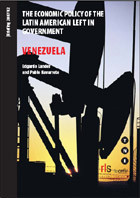The economic policy of the Latin American left in government: Venezuela
Topics
Regions
Venezuela has undergone profound political and social changes since Hugo Chávez assumed the presidency in February 1999, which have been reflected in the fundamental pillars of the government’s economic policy.

Downloads
Authors
Venezuela has undergone profound political and social changes since Hugo Chávez assumed the presidency in February 1999. These transformations have been reflected in the fundamental pillars of the government’s economic policy. Chávez’s initially spoke about combating “savage neo-liberalism” and searching for a more humane capitalism. This discourse has evolved, however, culminating in Chávez’s public statement in January 2005 in which he spoke of the need to create a 21st Century Socialism.
In this briefing, Edgardo Lander and Pablo Navarrete identify three key stages in the development of the Chávez government’s economic policy. The first phase, which dates from the start of Chávez’s presidency, culminated in the passing of the so-called “Enabling Laws” in November 2001. These involved a series of measures to end the “neo-liberal agenda” in economic policymaking. A second phase, which lasted until mid-2003, saw a battle for state control. During this period, opponents of the Bolivarian Project used a variety of insurgent-type policies, most notably the April 2002 coup and the 2002-2003 oil strike. The third phase began in mid-2003 with the implementation of government social programmes known as “Missions” and continues to the present day. It is characterised by the creation of various mechanisms to facilitate structural changes in the Venezuelan economy.
Pages: 52
